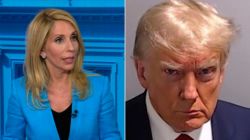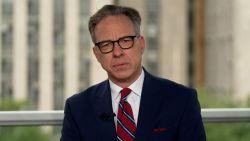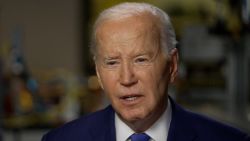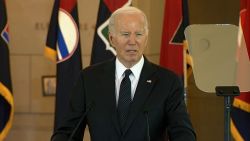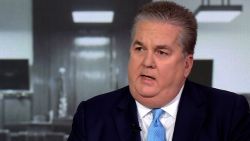Editor’s Note: Julian Zelizer, a CNN political analyst, is a professor of history and public affairs at Princeton University. He is the author and editor of 25 books, including the New York Times best-seller, “Myth America: Historians Take on the Biggest Lies and Legends About Our Past” (Basic Books). Follow him on Twitter @julianzelizer. The views expressed in this commentary are his own. View more opinion on CNN.
On Thursday evening, Donald J. Trump had his mug shot taken as he was booked at the Fulton County Jail in Atlanta. The sheriff office’s record listed the former president as “White Male 6’ 3” 215 lbs” with “Blond or Strawberry” hair and “blue” eyes.
Trump, who was indicted for the fourth time earlier this month, faces more than a dozen charges under Georgia’s version of the RICO statute — originally used to prosecute organized criminal syndicates — alongside 18 co-defendants for their alleged efforts to overturn the results of the 2020 election in the Peach State.
In any other moment in American history, the news of a former US president being booked in a jail while trying to win back the White House would be absolutely shocking. The landmark moment would end any candidacy and assure its place in future history textbooks.
But that is not necessarily the reaction we’re seeing today. With Trump facing an array of legal troubles, the latest news is, for many Americans, just another booking, on just another day, in what is just another example of Trump being Trump.
It is extraordinarily dangerous for Americans to become immune to allegations of wrongdoing by our politicians. Many of the guardrails in our political system require politicians to realize that the public has limits to what rhetoric and behavior they will accept from our elected officials.
Public sentiment has historically played a huge role in the downfall of politicians who abused their power. When Republicans finally buckled in August 1974 and three top party members—Sen. Barry Goldwater, Sen. Hugh Scott, and Rep. John Rhodes — went to the Oval Office to warn President Richard Nixon that his colleagues would not stand by him should articles of impeachment reach the Senate, they were making a political calculation as well as reacting to a mounting sense of public outrage.
The same dynamics have been true of lower-level scandals that have brought down elected officials and civil servants as a result of their misbehavior.
Over the past few decades, we have seen the erosion of norms around what is acceptable for politicians to say and do. Some of the most dramatic elements of the Trump presidency stemmed from the little concern he seemed to have over flouting rules and norms. When a whistleblower revealed that Trump had pressed Ukrainian President Volodymyr Zelensky to find dirt on Hunter Biden, Trump didn’t deny what he had done but rather insisted that it was a “perfect” phone call. Even after violence erupted at the US Capitol on January 6, 2021, and the effort to overturn the 2020 election had failed, he doubled down on his election denialism. He attacked investigators through his public rhetoric, refused to follow traditional decorum and seemed to say whatever he wanted to.
Despite his smashmouth rhetoric and legal troubles, however, Trump remains the frontrunner in the 2024 GOP primary. Even some of his opponents have defended him. It is unclear that the indictments — or even any potential convictions — would be sufficient to knock him out of the political arena. Trump, having survived two impeachments due to intense loyalty from Republicans on Capitol Hill, has reason to believe that he could withstand these charges and whatever outcome unfolds.
In what was perhaps the most telling moment in the first Republican primary debate on Wednesday night, the majority of the candidates raised their hands when they were asked whether they would support Trump should he win the nomination and be criminally convicted.
Vivek Ramaswamy raised his hand more quickly than Tracy Flick in the 1999 film “Election.” Former UN Ambassador Nikki Haley, Sen. Tim Scott, and North Dakota Gov. Doug Burgum all followed, although they appeared to do so more grudgingly. Florida Gov. Ron DeSantis came off like a politician who shifts whichever way the winds are blowing by looking to the candidates on either side of him before raising his hand. Even Pence raised his hand. Given everything he has said about choosing the Constitution over Trump and depicting himself as someone who stood on the right side of history, Pence showed it’s entirely possible for Trump to coalesce support even among his critics and primary opponents.
Among voters, Trump still retains a hefty lead in the 2024 Republican primary polls. And many Democrats might be numb from the onslaught of accusations, indictments and scandals.
Basically, Trump might be right to think he still has a chance at becoming president. Some of the reason that shock is increasingly fleeting in our public culture goes far beyond him. Continually rising distrust in government since the 1960s has diminished expectations about our leaders. The rapid media cycle has the capacity to move from one issue to the next within hours, weakening the ability to keep national conversations focused on one topic. And in an intensely polarized world, issues and scandals don’t move people as much when there are partisan considerations at play.
Although other politicians have deployed similar strategies, with Nixon reportedly calling the Watergate hearings a “witch hunt”, nobody has launched the same level of assault on decency as Trump. In many cases, he has owned the controversial statements he made, been open about flouting the rules and doubled down when criticized for his egregious behavior. Often, he simply turns the tables by questioning the legitimacy of his accusers, discrediting those who dare question his comments and behavior, warning that any attacks on him are really attacks on his supporters.
As a result, when many Americans see a mug shot like this, the photograph barely causes a stir.
Regardless of where one stands, the former president of the United States turning himself in for charges stemming from the effort to reverse the democratic will of the American people should sink in as a historic moment in the United States.
The legal system is now at work, holding Trump to account in many cases where the political world failed to take meaningful action. However, without a serious shift in public opinion, Trump might just learn that it is possible to do almost anything and still retain immense influence in politics.


